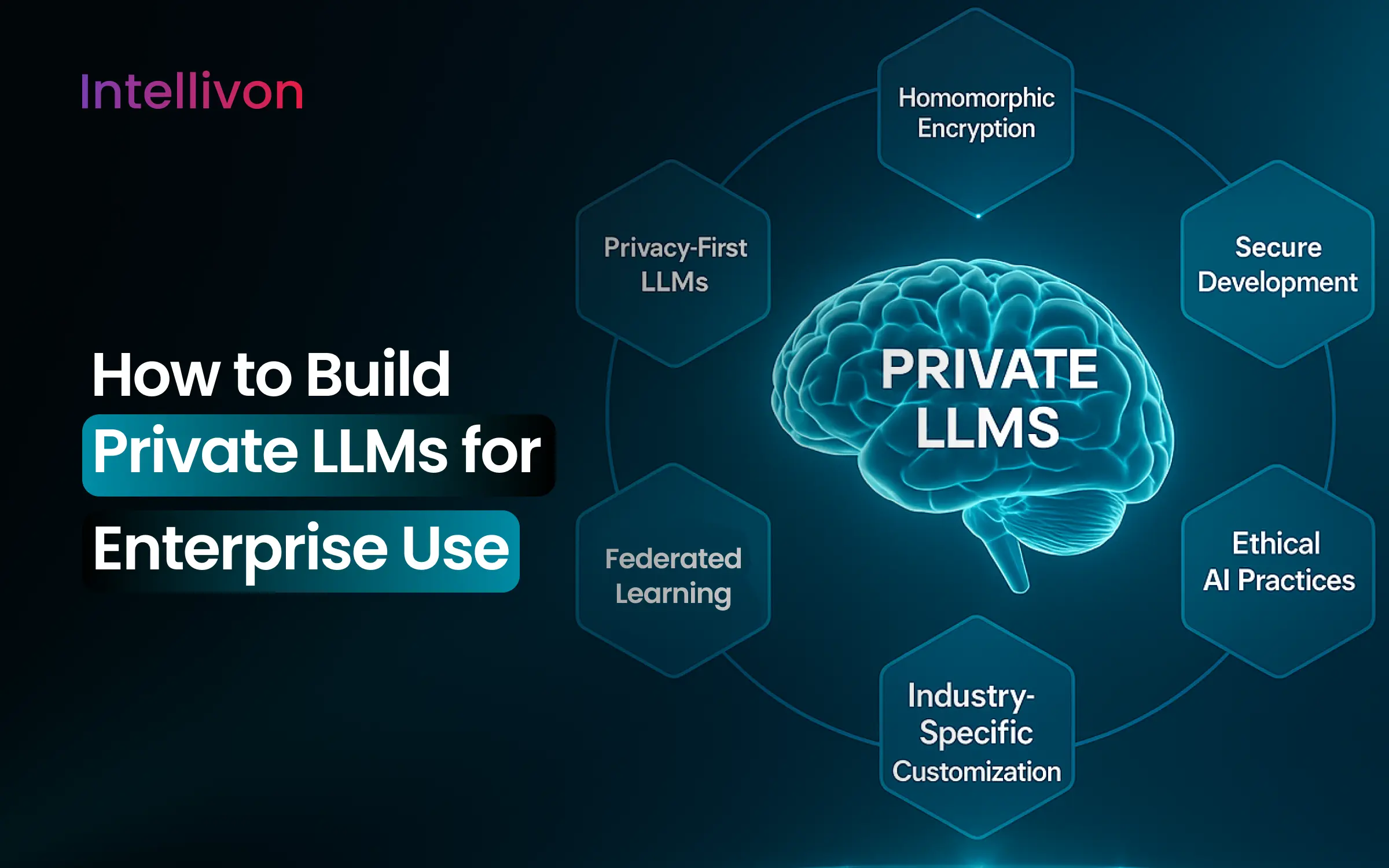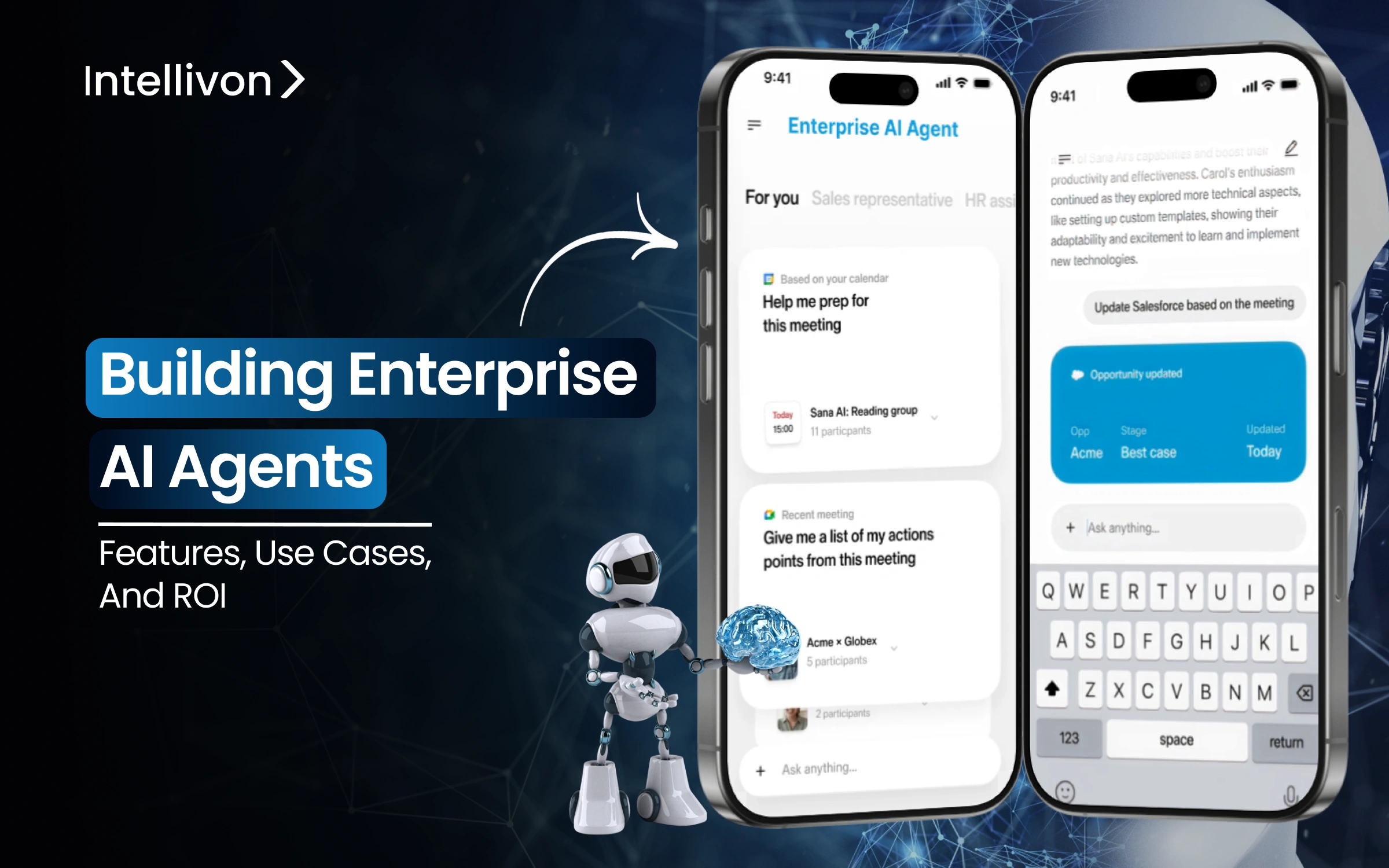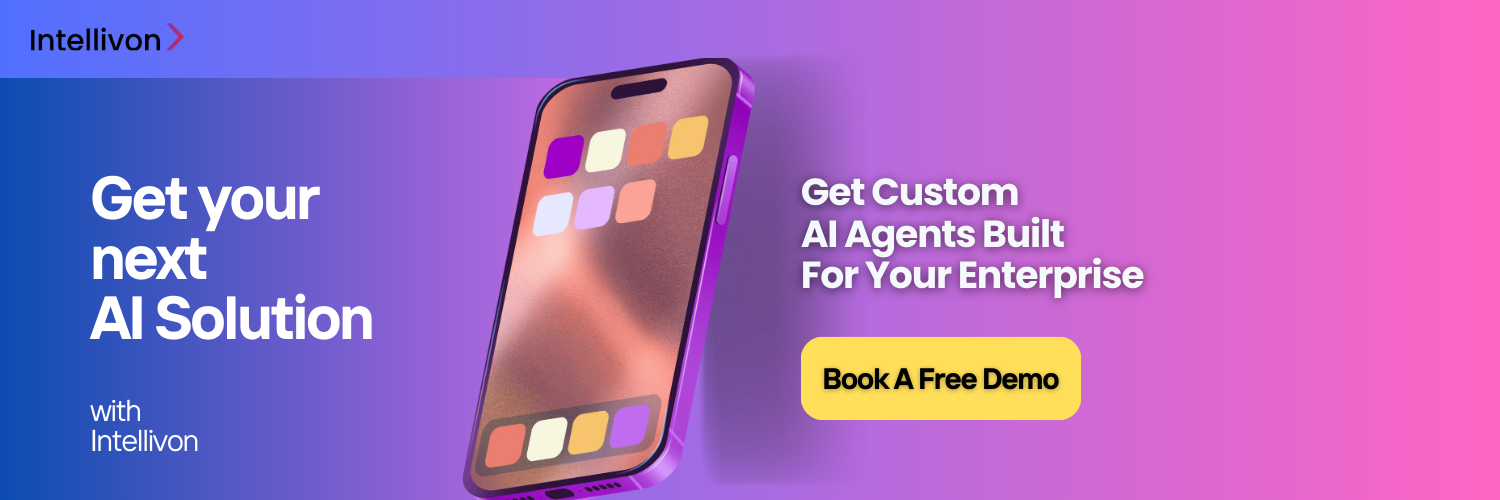AI agents are quickly becoming essential for modern business operations. They provide a high level of efficiency, automation, and scalability. Unlike traditional tools that remain on the sidelines, AI agents easily fit into the workflow. They connect with existing CRMs, ERPs, service management platforms, and more. These AI agents understand their working environment. This allows them to make decisions in real time, automate tasks, and improve over time. The best part is that they are available to everyone in a company, not just developers or data engineers. This makes AI accessible, allowing teams to take advantage of its capabilities without requiring specialized skills.
At Intellivon, we focus on building and integrating AI agents into business systems. We ensure these agents work seamlessly with operations while delivering a good return on investment. In this blog, we will look at the main features of AI agents, their uses in various industries, and how they can change your workflows and boost productivity. We will also discuss the return on investment of AI agents and share practical insights for implementing them.
Why Enterprises Are Investing in AI Agents Now
The enterprise AI agents market is growing rapidly. By 2025, it is expected to reach $5.09–$7.9 billion. Some forecasts predict it could rise to $50–$230 billion by 2030-2034.
In fact, experts believe the market may even surpass $200 billion by 2034. This growth is driven by major factors such as hyperautomation, the shift to cloud-based deployment, and advancements in natural language processing (NLP) and machine learning (ML).
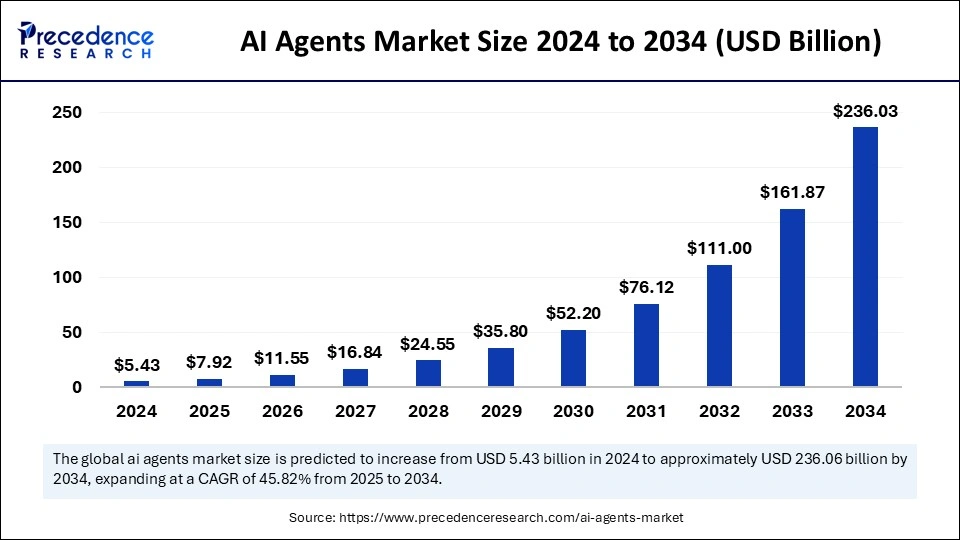
Key Market Insights:
- 19% of organizations have scaled AI agent use across their operations.
- 43% of enterprises now allocate half or more of their AI budget to agentic solutions.
- 96% of IT decision-makers plan to expand AI agent usage in 2025.
- 62% of senior executives expect over 100% ROI from AI agents.
- The average projected ROI globally is 171%, with 192% ROI for U.S. firms.
- 71% of companies report improved automation, faster decisions, and leaner operations with AI agents.
- In financial services, 53% of firms address risk, compliance, fraud, and reporting issues with AI agents.
- 40% of financial firms see strong ROI from AI agent implementation.
Siemens implemented AI agents across its electronics and automation factories to monitor production lines and coordinate maintenance tasks. By analyzing real-time machine data and predicting failures, the agents reduced unplanned downtime by 20% and optimized scheduling for maintenance crews. This not only increased production efficiency but also lowered operational costs by an estimated 12% within the first year of deployment.
American Express deployed AI agents to handle routine customer queries and detect fraud patterns. These agents analyze transaction data and customer interactions in real time, resolving over 30% of inquiries without human intervention. This led to faster response times, higher customer satisfaction, and a 15% reduction in operational costs in support services. (American Express AI adoption report)
What Are AI Agents in the Enterprise Context?
AI agents are smart software programs that carry out tasks, make decisions, and improve business operations with little human involvement. Unlike traditional automation tools, AI agents can examine data, learn from interactions, and adjust as they go. Here’s what makes them effective in a business environment:
- Interpret natural language: AI agents can understand and respond to human language, making interactions feel more natural and efficient.
- Connect across tools and databases: They can pull data from multiple systems like CRMs, ERPs, and service platforms, enabling smooth communication and decision-making across departments.
- Automate multi-step workflows: AI agents can handle complex tasks, such as customer support inquiries or data processing, by following multiple steps without human intervention.
- Learn and improve over time: As AI agents process more data, they get better at making decisions, increasing their efficiency and accuracy.
- Operate within enterprise-grade security frameworks: AI agents ensure all actions are secure, with encrypted data and compliance with industry standards, critical for sensitive sectors like finance or healthcare.
For example, in a customer service department, AI agents can automatically respond to inquiries, analyze sentiment, and escalate complex issues to human agents, improving both response time and customer satisfaction.
In addition, AI agents in finance can monitor transactions in real-time, detect fraud, and provide reports to financial teams. By automating these routine tasks, AI agents help businesses become more efficient and scale quickly.
They work within established workflows, adding value without disrupting existing systems, and continuously improving as they gather more data. This makes AI agents an essential tool for businesses looking to improve productivity, decision-making, and customer experience, all while saving time and reducing costs.
How AI Agents in Enterprises Work
AI agents in businesses follow a clear, organized process. This process has three main stages: Perception, Planning, and Execution. An AI agent’s operations resemble the way humans solve problems. We collect information, plan a solution, and take action.
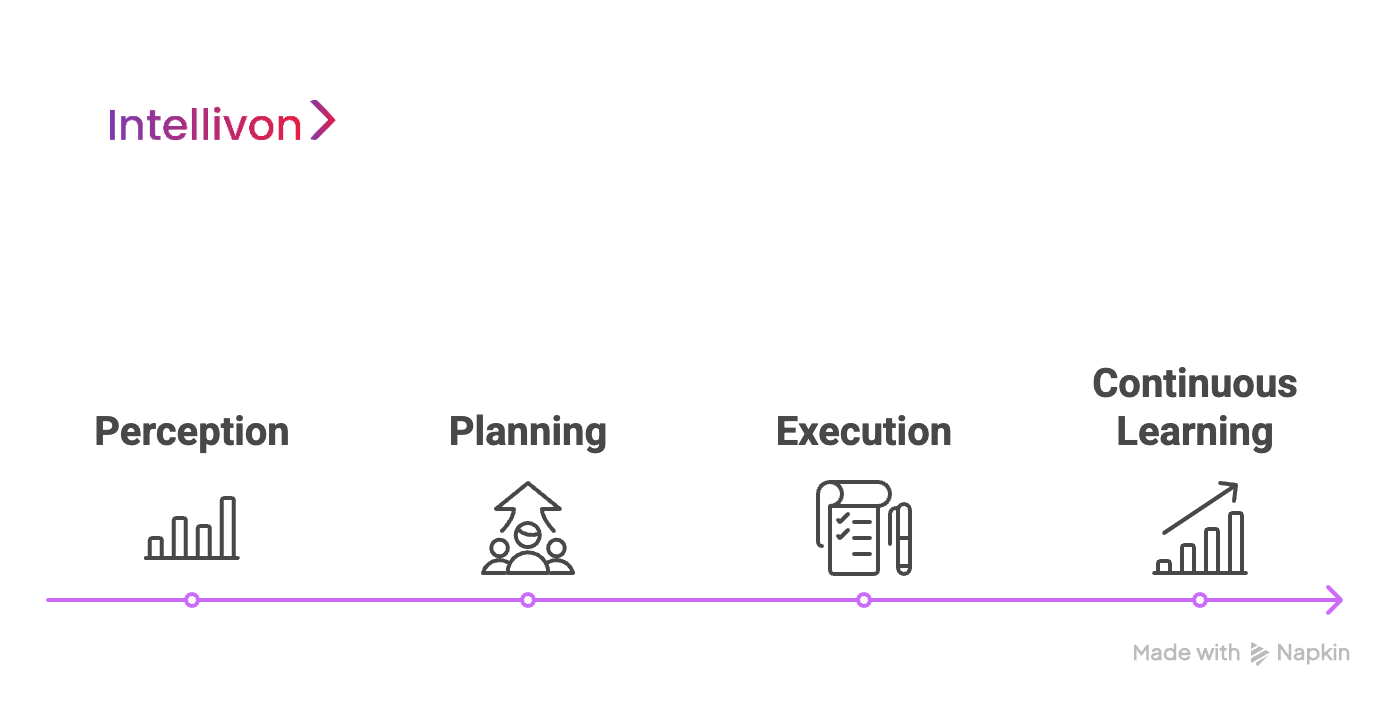
1. Perception (Data Collection)
The first step is gathering data from various enterprise systems, such as CRMs, databases, emails, and internal documents. AI agents rely on NLP and ML to interpret this data in context, understanding its relevance and significance.
2. Planning (Decision-Making)
Once the data is processed, the AI agent plans its next steps. It uses algorithms to analyze the situation, determine the best course of action, and prioritize tasks. For instance, in customer support, the agent might decide whether a query can be resolved automatically or needs human assistance.
3. Execution (Action)
After planning, the AI agent executes the chosen actions. This could involve sending an email, updating a customer record, logging tasks, or routing issues to the appropriate team members.
It’s the final step in the problem-solving process, similar to how a human would implement a solution.
4. Continuous Learning
As the agent interacts with more data and completes tasks, it learns and improves its performance, adapting to the business environment over time. This is like how humans learn from their experiences and make better decisions in the future.
Example
In a finance setting, imagine an AI agent working in a bank’s fraud detection system.
- The agent perceives incoming transaction data from customer accounts and analyzes patterns using machine learning models.
- It plans its course of action by comparing the current transaction to historical data, detecting anomalies such as unusual spending behavior or location mismatches.
- The agent then executes its action by flagging the transaction, notifying the fraud team, and even temporarily blocking the transaction.
- As it interacts with more data, the AI agent continuously learns and improves its fraud detection capabilities, reducing false positives over time and improving overall security.
Types of AI Agents in Enterprise Applications
AI agents come in different types based on how they make decisions and interact with their environment. These agents carry out various tasks, from simple automation to complex decision-making. Here’s a look at six key types of AI agents used in enterprise applications:
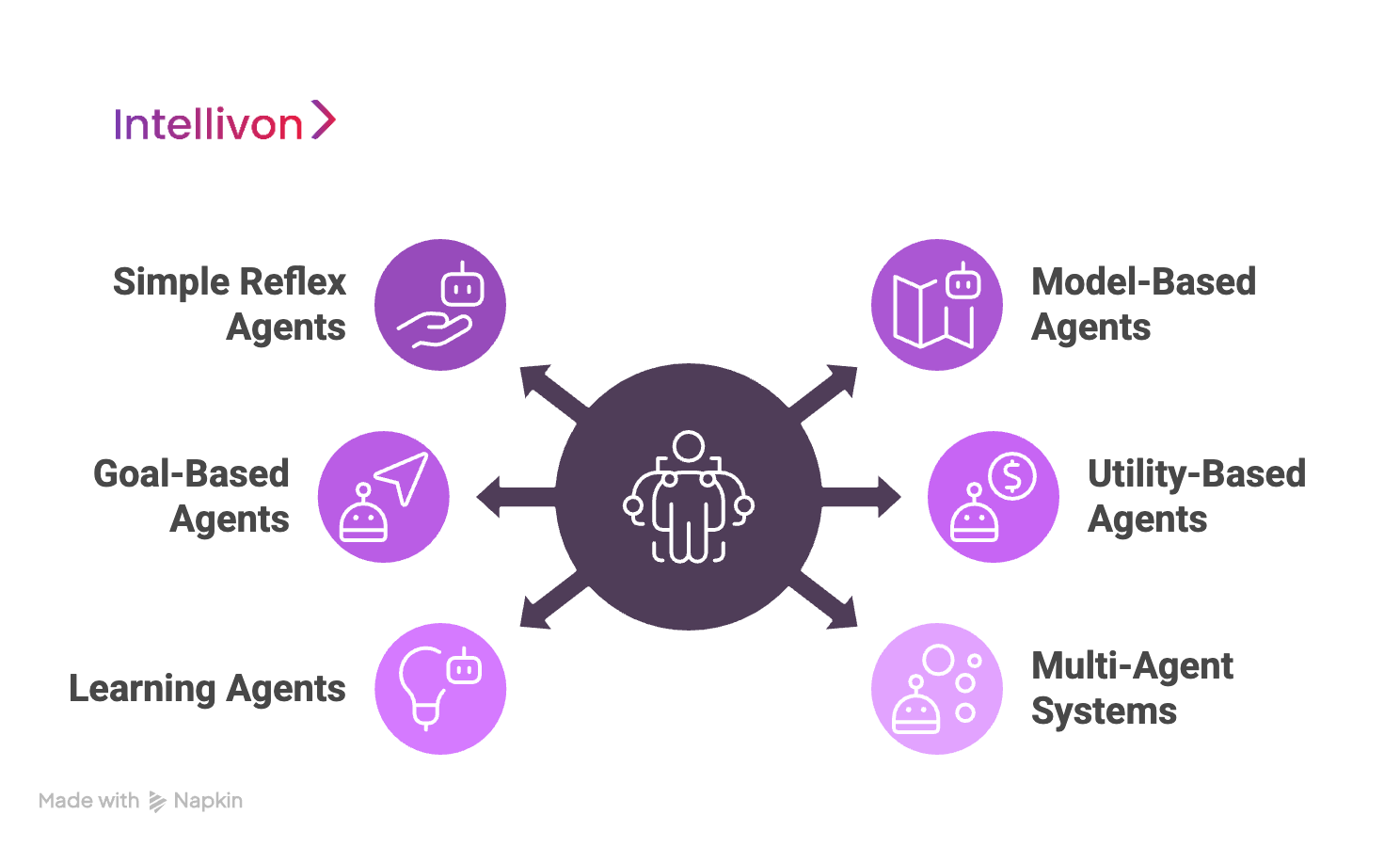
1. Simple Reflex Agents
Simple Reflex Agents are the most basic type of AI agents. They respond to specific stimuli or inputs based on predefined rules. These agents don’t require deep reasoning or memory. They simply “react” to an event or condition.
Key Characteristics:
- Condition-Action Rules: Simple reflex agents operate on if-then rules that trigger specific actions when certain conditions are met.
- No Memory: They don’t store past actions or states. Each decision is based solely on the current situation.
- Quick Responses: These agents act immediately when a specific input is received.
How It Works in an Enterprise:
In customer service, for instance, a simple reflex agent can automatically respond to basic customer queries like password resets or order status checks, reducing the workload for human agents.
2. Model-Based Agents
Model-Based Agents go beyond simple responses. They maintain an internal model of the world and use this model to understand the state of their environment. These agents update their internal model as they gather more data, allowing them to adapt their behavior.
Key Characteristics:
- Internal Model: They store a model of the environment and update it based on real-time data.
- Context Awareness: Model-based agents use their model to make more informed decisions, considering past actions and their effects.
- Adaptability: They adjust their behavior based on changes in the environment.
How It Works in an Enterprise:
In manufacturing, a model-based agent might monitor machinery performance. If a machine is running below optimal levels, the agent adjusts the workflow or triggers maintenance requests to avoid downtime.
3. Goal-Based Agents
Goal-Based Agents are designed to achieve specific objectives. They don’t simply react to inputs; instead, they take actions that help them reach a particular goal. These agents analyze possible actions and choose the one that most effectively helps them achieve their goals.
Key Characteristics:
- Goal-Oriented Behavior: These agents focus on completing specific tasks or goals, such as improving sales or reducing costs.
- Decision-Making: They assess multiple potential actions and choose the one that moves them closest to their goal.
- Dynamic Adaptation: They can change their approach if their initial plan is not working.
How It Works in an Enterprise:
For example, in sales, a goal-based agent could prioritize leads that are most likely to convert, automatically sending follow-up emails or scheduling calls to move them through the sales funnel.
4. Utility-Based Agents
Utility-based agents are more advanced than goal-based agents. They assign a utility value to each possible action and choose the one that maximizes overall satisfaction or benefit. These agents aim to maximize long-term benefits, such as profit or customer satisfaction, while minimizing risks.
Key Characteristics:
- Utility Function: They use a utility function to evaluate actions based on the value they bring to the business.
- Optimizing Outcomes: Instead of simply meeting a goal, they focus on maximizing overall benefits by considering all potential outcomes.
- Decision Flexibility: These agents weigh the pros and cons of each action before taking the best course of action.
How It Works in an Enterprise:
In marketing, a utility-based agent could help a company decide between several promotional offers by analyzing customer data and selecting the most effective option to increase customer engagement and ROI.
5. Learning Agents
Learning Agents continuously improve their performance over time by learning from their experiences. These agents can adjust their behavior based on the data they collect, making them highly adaptable and efficient in dynamic environments.
Key Characteristics:
- Learning and Adaptation: They improve over time by learning from data and experiences, often using machine learning techniques.
- Continuous Improvement: Their performance gets better as they interact with the environment and gather more information.
- Feedback Loops: Learning agents rely on feedback from their actions to refine their strategies.
How It Works in an Enterprise:
In finance, a learning agent might analyze past transactions and detect patterns in spending habits. It could then adjust fraud detection algorithms, continuously improving its accuracy in identifying suspicious activity.
6. Multi-Agent Systems
Multi-agent systems involve multiple AI agents working together to solve a problem or complete a task. These agents collaborate, communicate, and share data to achieve a common goal, making them particularly useful in complex environments.
Key Characteristics:
- Collaboration: Multiple agents work together, sharing information and coordinating actions.
- Distributed Decision-Making: Each agent may handle different aspects of a larger task, contributing to the overall solution.
- Scalability: Multi-agent systems can be scaled up easily to handle more complex tasks.
How It Works in an Enterprise:
In logistics, multi-agent systems can optimize delivery routes. One agent might be responsible for tracking packages, while another handles route optimization. Together, they reduce delivery times and improve customer satisfaction.
Must-Have Features of Enterprise AI Agents
Enterprise AI agents are powerful tools that boost efficiency, automate workflows, and improve decision-making. To ensure these agents provide the most value, they need specific essential features that help them function effectively in complex business settings. Here are the key features that define a strong AI agent in enterprise operations:
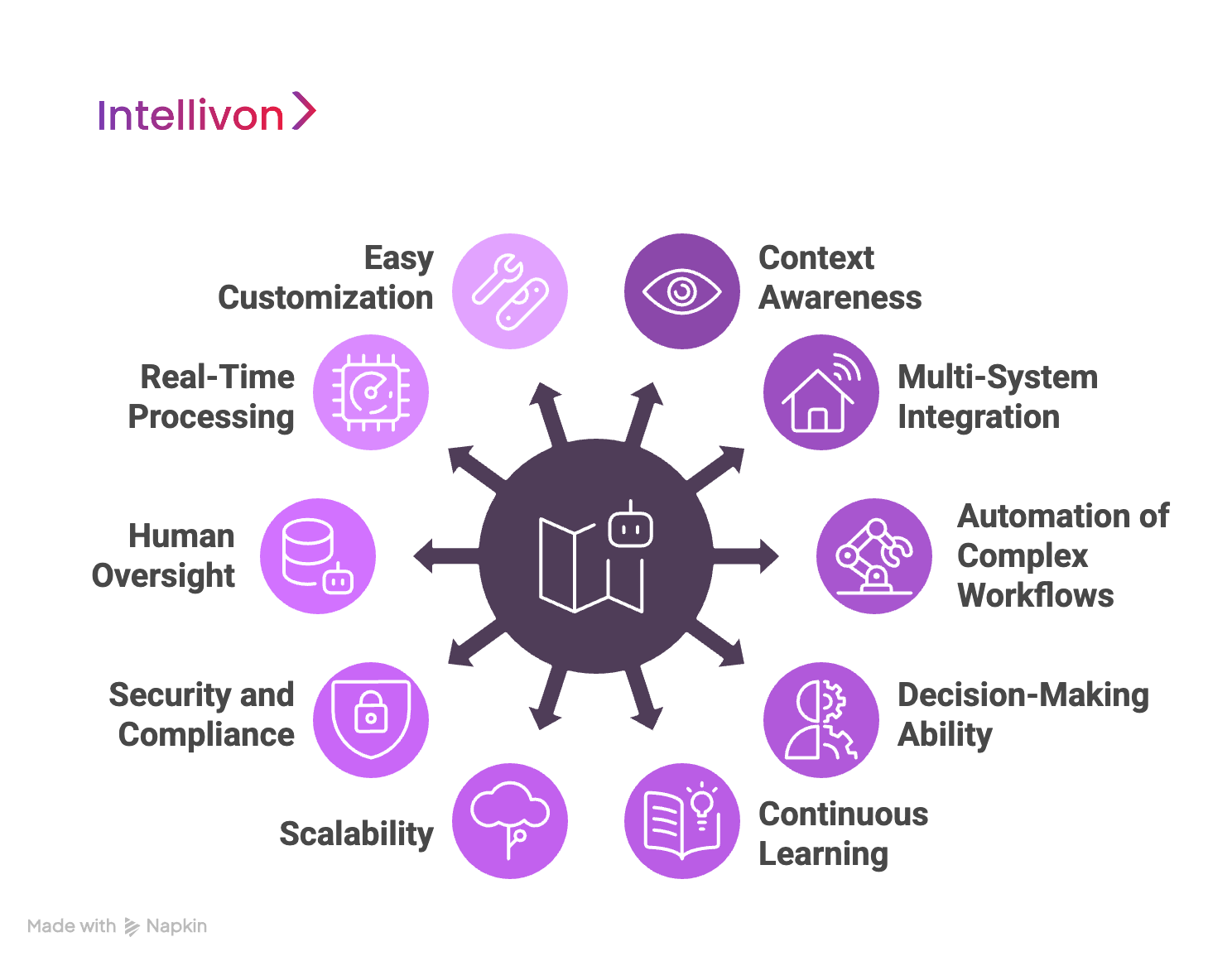
1. Context Awareness
AI agents must be able to understand and process the context in which they operate. This means they can interpret data, adapt their actions, and respond appropriately based on real-time situations.
2. Multi-System Integration
To be truly effective, AI agents need to integrate seamlessly across various enterprise systems like CRMs, ERPs, and service management platforms. This ensures they can pull data, trigger actions, and work across departments without disrupting existing workflows.
3. Automation of Complex Workflows
Enterprise AI agents should handle multi-step tasks without human intervention. They must automate processes such as customer support, data entry, and invoice processing, freeing up valuable resources for more strategic work.
4. Decision-Making Ability
AI agents must be capable of making informed decisions. Using data analytics and machine learning, they should evaluate options and choose the best course of action, whether it’s resolving customer queries or optimizing production schedules.
5. Continuous Learning
AI agents should improve over time. They must learn from past interactions and data, fine-tuning their decision-making processes and actions to become more efficient and accurate with each task they perform.
6. Scalability
As enterprises grow, their needs evolve. AI agents should be scalable, capable of handling increasing volumes of data and more complex tasks without compromising performance.
7. Security and Compliance
AI agents must operate within enterprise-grade security frameworks, ensuring they adhere to strict data protection, encryption standards, and regulatory compliance. This is especially crucial in sectors like finance and healthcare.
8. Human Oversight
While AI agents are autonomous, human oversight remains essential. AI agents should allow for manual intervention when needed, ensuring that humans can review decisions, especially for complex or sensitive matters.
9. Real-Time Processing
For AI agents to make relevant decisions, they must process data in real time. This capability is vital in environments like customer service or financial transactions, where quick responses can significantly impact outcomes.
10. Easy Customization
AI agents should be flexible enough to be customized without needing deep technical knowledge. Business users should be able to create, tweak, and update agents using natural language or simple interfaces, reducing reliance on IT.
These features define the effectiveness of AI agents in enterprise operations. By ensuring they have these core attributes, businesses can unlock significant value in terms of efficiency, productivity, and scalability.
Enterprise AI Agent Use Cases Across Industries
AI agents are increasingly being adopted across various industries to automate processes, enhance decision-making, and boost efficiency. Here’s how they are transforming seven key industries, with detailed use cases and examples of their impact.
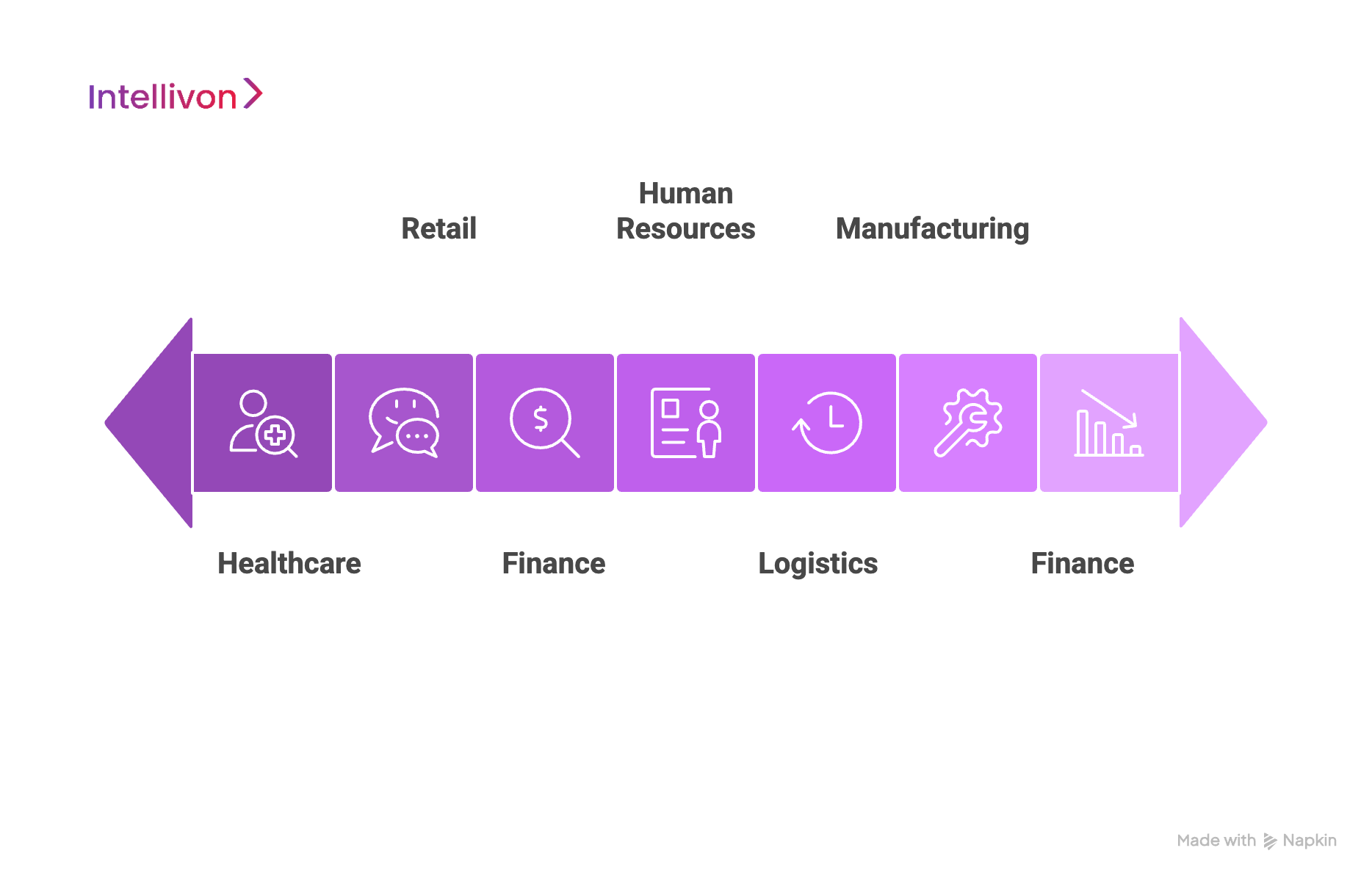
1. Healthcare
AI agents in healthcare are revolutionizing patient care, operational efficiency, and decision-making processes, enabling healthcare providers to offer better services at reduced costs.
- Patient Support: AI agents are used to handle administrative tasks such as appointment scheduling, medication reminders, and answering frequently asked questions. For example, AI-powered virtual assistants help patients book appointments without human intervention, reducing waiting times and easing the workload of administrative staff.
- Diagnostic Assistance: AI agents assist doctors by analyzing medical data, including images, test results, and historical patient records, to suggest possible diagnoses. By processing vast amounts of data, they can identify patterns that may go unnoticed by humans, leading to more accurate diagnoses.
- Personalized Care: AI agents can recommend personalized treatment plans based on individual patient data, such as genetics, lifestyle, and medical history. These agents continuously update their recommendations based on real-time data, helping doctors make better-informed decisions.
Example:
Mayo Clinic uses AI agents to assist with patient support, reducing appointment wait times by 50% and consumer satisfaction up to 20%.
2. Retail
AI agents are transforming retail by enhancing customer experiences, improving inventory management, and optimizing marketing strategies. Here’s how they are being used in the retail sector:
- Customer Service: AI agents in the form of chatbots or virtual assistants provide customers with instant responses, helping resolve inquiries related to products, orders, and shipping. These agents are available 24/7, offering consistent support and ensuring higher customer satisfaction.
- Inventory Management: AI agents are capable of tracking inventory in real time, forecasting demand, and optimizing stock levels. By predicting product shortages and excesses, they prevent stockouts and minimize waste, ensuring businesses maintain optimal inventory levels.
- Personalized Recommendations: AI agents analyze customers’ purchase history, browsing habits, and preferences to offer tailored product recommendations. This leads to an increase in sales and customer loyalty by presenting customers with items they are more likely to purchase.
Example:
Sephora implemented AI agents for personalized product recommendations, resulting in a 10% increase in sales conversions. Their AI-powered system also enhanced customer engagement by providing tailored shopping experiences.
3. Finance
AI agents in the finance industry automate tasks like transaction monitoring, fraud detection, and financial reporting, all while helping organizations make data-driven decisions.
- Fraud Detection: AI agents monitor transactions in real time to detect fraudulent activity. By analyzing patterns in spending behavior, these agents can flag suspicious transactions and alert the relevant departments, preventing financial loss.
- Automated Reporting: AI agents automate the creation of financial reports, reducing manual work and the risk of errors. They can extract data from multiple sources, generate reports, and send them to stakeholders, saving both time and resources.
- Risk Assessment: AI agents analyze financial data and market trends to assess potential risks, such as market volatility, credit risk, and compliance violations. By continuously monitoring these factors, they provide insights that help businesses mitigate risks and make informed investment decisions.
Example:
HSBC uses AI agents to detect fraud across over 1 million transactions daily, leading to a 20% reduction in fraud-related losses. Their AI system also processes large amounts of transaction data to ensure compliance and reduce manual oversight.
4. Manufacturing
In manufacturing, AI agents help monitor production lines, predict equipment failures, and streamline supply chains, making operations more efficient and cost-effective.
- Predictive Maintenance: AI agents monitor machinery and equipment, analyzing real-time data to predict when maintenance is needed. This proactive approach reduces unplanned downtime, increases equipment lifespan, and lowers maintenance costs.
- Quality Control: AI agents are used to analyze production data and identify defects in products or inefficiencies in the manufacturing process. They can even use computer vision to detect visual defects on assembly lines, ensuring high-quality standards.
- Supply Chain Optimization: AI agents help manufacturers optimize inventory levels by predicting demand, managing suppliers, and adjusting production schedules accordingly. This reduces waste and ensures the timely delivery of products to customers.
Example:
Siemens implemented AI agents to monitor production equipment, reducing unplanned downtime by 25% and improving overall factory efficiency. Their AI-powered predictive maintenance solution significantly cut maintenance costs.
5. Logistics and Supply Chain
AI agents in logistics are optimizing delivery routes, tracking shipments, and improving supply chain management, leading to cost savings and increased operational efficiency.
- Route Optimization: AI agents use real-time traffic data and historical delivery information to optimize delivery routes. This helps businesses save fuel, reduce delivery times, and improve customer satisfaction by ensuring faster deliveries.
- Shipment Tracking: AI agents track the movement of goods in real time, providing businesses with updates on location, temperature, and condition. They help ensure the safety of goods and improve transparency for both suppliers and customers.
- Inventory and Demand Forecasting: AI agents predict inventory needs by analyzing trends, sales history, and seasonal fluctuations. They help companies maintain optimal stock levels, avoid overstocking, and prevent stockouts.
Example:
DHL uses AI agents for real-time delivery route optimization, saving 10% on fuel costs and improving delivery efficiency. The AI system also helps reduce delays and improve customer satisfaction.
6. Human Resources
In HR, AI agents automate recruitment, streamline onboarding, and improve employee engagement, allowing HR teams to focus on strategic initiatives.
- Resume Screening: AI agents automatically screen resumes based on predefined criteria, such as skills, qualifications, and experience. This speeds up the hiring process and ensures that only qualified candidates move forward.
- Employee Onboarding: AI agents handle the onboarding process by providing new hires with essential information, scheduling training, and completing paperwork. This automation reduces the workload of HR teams and ensures a smoother experience for new employees.
- Employee Engagement: AI agents gather employee feedback, conduct surveys, and offer personalized development recommendations. By analyzing employee satisfaction data, they help HR teams identify areas for improvement.
Example:
Unilever uses AI agents in recruitment, reducing hiring process time by 50%. Their AI-powered system also helps improve the quality of candidates selected for interviews.
7. Customer Service
AI agents are reshaping customer service by providing faster responses, improving service quality, and enhancing customer satisfaction.
- Ticket Resolution: AI agents automatically resolve common customer service issues, such as billing inquiries, order tracking, and account management. This reduces the load on human agents and ensures quicker resolutions.
- Live Chat Support: AI-powered agents provide instant support, answering questions and resolving problems in real time. They can handle a variety of customer inquiries without requiring human intervention.
- Customer Feedback Analysis: AI agents analyze customer feedback from surveys, social media, and reviews to identify trends and sentiment. This helps businesses improve their products and services based on real customer experiences.
Example:
Zendesk uses AI agents to improve customer support efficiency, reducing 40% of ticket resolution time and increasing customer satisfaction. Their AI-powered system handles routine inquiries, allowing human agents to focus on complex cases.
These real-world use cases illustrate the transformative power of AI agents in driving efficiency, cost savings, and improved decision-making across industries. From healthcare to logistics, AI agents are enhancing enterprise operations, enabling businesses to scale and innovate with ease.
Our Architecture Behind Robust Enterprise AI Agents
At Intellivon, we’ve built an architecture for AI agents that’s robust, scalable, and seamlessly integrates into enterprise operations. Our approach is designed to grow with your business, ensuring that our AI agents can handle complex workflows and scale as your business needs evolve. Here’s an overview of the key components that make up our AI agents:
1. NLU and LLM
Our AI agents are powered by advanced NLU and LLM technologies, enabling them to understand and process human language accurately. Whether it’s text or speech, our agents interpret commands, inquiries, and feedback in natural language, ensuring smooth interactions with users across departments.
2. Decision Engine
The decision engine forms the core of our AI agents, enabling them to make informed decisions in real time. It evaluates data, identifies patterns, and selects the most effective course of action to meet business goals. This is crucial for tasks like automated customer support or workflow optimization.
3. Knowledge Base
Our agents are equipped with a knowledge base that pulls data from existing enterprise systems like CRMs, ERPs, and internal documentation. This ensures that the agent has relevant, up-to-date information to make accurate decisions and provide valuable insights without needing human intervention.
4. Integration Layer
To seamlessly fit into your enterprise systems, our integration layer allows the AI agents to connect with various tools, platforms, and databases. This ensures that the agents work across systems like HR platforms, financial software, and customer service tools, enhancing cross-departmental collaboration.
5. Monitoring and Feedback
Continuous improvement is at the heart of our architecture. Our AI agents are equipped with monitoring and feedback mechanisms that track performance and gather insights from their interactions. This data allows the agents to adapt and optimize their behavior, ensuring they continue to meet your evolving needs.
6. Context Management
AI agents need to understand context to make relevant decisions. Our context management system ensures that agents are aware of the current state, previous interactions, and external factors, allowing them to handle complex, multi-step workflows efficiently.
7. Latency Management
Time is critical in enterprise operations, which is why we’ve implemented latency management features. Our AI agents are designed to process data and take action in real time, ensuring that responses are quick and efficient, even during high-volume tasks
8. Multimodal Input and Output
Our AI agents support multimodal inputs and outputs, meaning they can handle data from various sources, whether it’s text, voice, or even visual data. This flexibility allows them to provide a more personalized experience and communicate across multiple channels, like email, chat, or voice assistants.
9. Personalization Modules
Our AI agents personalize interactions by learning from each user’s preferences, behavior, and history. Whether it’s recommending products or customizing workflows, this personalization ensures that each interaction feels tailored and relevant.
10. Fallback and Escalation
Even the smartest agents need backup. Our fallback and escalation mechanism ensures that when an AI agent encounters an issue or a task it cannot handle, it can escalate the case to a human agent seamlessly. This ensures continuous service and maintains a high level of support.
Intellivon’s architecture combines these essential components to deliver AI agents that are not only robust but also scalable, designed to fit the needs of your enterprise today and in the future. With our solution, your business can automate tasks, make data-driven decisions, and enhance customer experiences, all while ensuring seamless integration with existing systems.
How We Build Enterprise AI Agents: Step-by-Step
At Intellivon, we’ve developed a proven, step-by-step process for building enterprise-grade AI agents that integrate seamlessly into your business operations. Our approach ensures that each AI agent is robust, scalable, and tailored to your unique needs. Here’s how we do it:
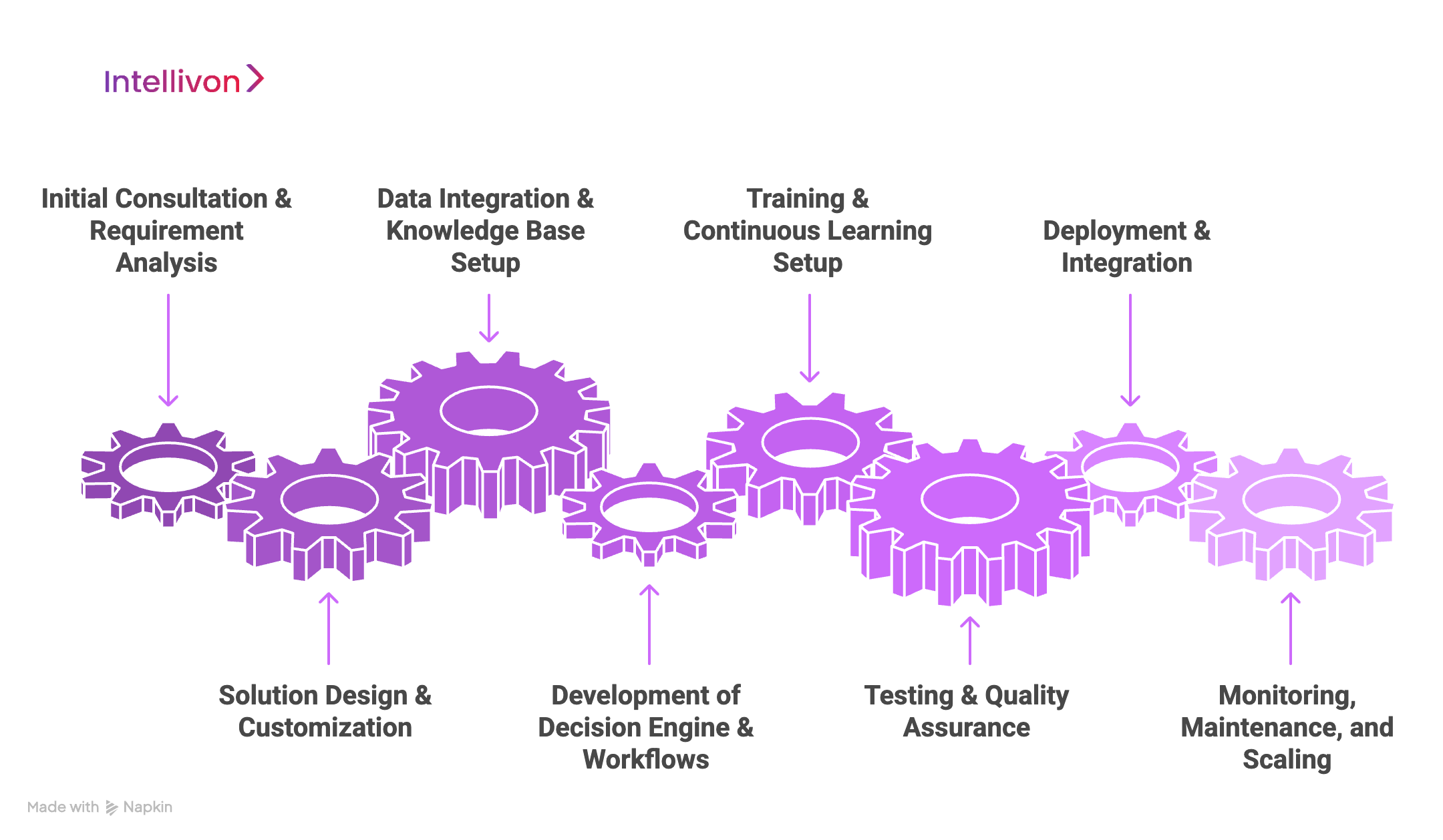
1. Initial Consultation & Requirement Analysis
The process begins with a consultation where we work closely with your team to understand your business objectives, challenges, and workflows. We analyze the specific areas where AI agents can deliver the most value, whether it’s improving customer service, automating HR tasks, or optimizing supply chains.
2. Solution Design & Customization
Once we have a clear understanding of your needs, we design a custom AI solution. This involves defining the agent’s role, capabilities, and key tasks, ensuring it aligns with your business goals. We also customize the AI agent to fit into your existing enterprise systems, including CRMs, ERPs, and databases.
3. Data Integration & Knowledge Base Setup
AI agents thrive on data. In this step, we integrate your existing data sources into the AI system. Whether it’s historical data, real-time inputs, or documents, we set up a knowledge base that ensures the AI agent has all the relevant information it needs to function effectively.
4. Development of Decision Engine & Workflows
At this stage, we develop the decision engine, which powers the AI agent’s ability to make intelligent choices based on the data it processes. We design and implement multi-step workflows that guide the agent through complex tasks, ensuring they perform efficiently and effectively.
5. Training & Continuous Learning Setup
AI agents need to learn and adapt over time. Using machine learning algorithms, we train the agent with historical data and test scenarios to ensure it improves as it interacts with users. We also set up feedback loops that help the agent continually learn and optimize its performance.
6. Testing & Quality Assurance
Before deployment, we rigorously test the AI agent in real-world scenarios to ensure it meets your performance and quality standards. This includes functional testing, stress testing, and ensuring that the agent can handle a range of tasks seamlessly. We also check for any issues with data security and compliance.
7. Deployment & Integration
Once tested, we deploy the AI agent into your live enterprise environment. We ensure it integrates smoothly with your existing systems, workflows, and teams, so it can start delivering value immediately. This includes setting up monitoring tools to track its performance in real-time.
8. Monitoring, Maintenance, and Scaling
After deployment, our job doesn’t end. We provide ongoing monitoring and maintenance to ensure the AI agent continues to perform optimally. As your business grows and evolves, we scale the AI agent accordingly, making adjustments and improvements to ensure it always meets your changing needs.
At Intellivon, we take a holistic approach to building AI agents, ensuring they are customized to fit your business’s unique needs while remaining scalable as your company grows. Our step-by-step process guarantees that the AI agents we create are seamlessly integrated, secure, and always aligned with your goals.
Overcoming Roadblocks to Enterprise AI Agent Adoption
Implementing AI agents in enterprise operations can significantly enhance efficiency, but businesses often face challenges during adoption. At Intellivon, we help companies overcome these roadblocks to ensure a smooth and successful AI agent integration. Here are six common challenges and how we provide the solution.
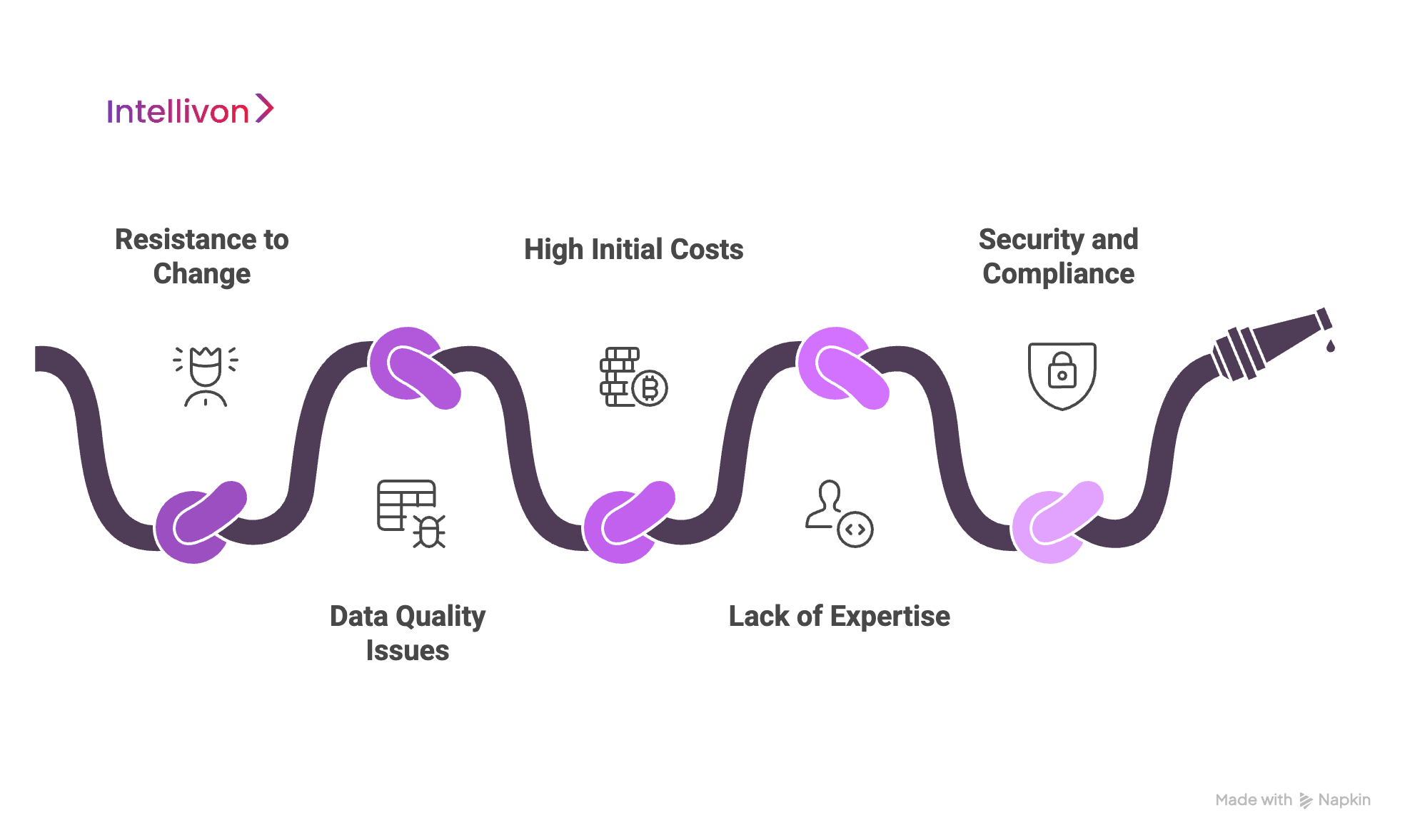
1. Resistance to Change
Many employees are hesitant to embrace AI due to fears of job displacement or unfamiliar technology.
Our Solution:
At Intellivon, we help businesses manage change by educating teams on the benefits of AI agents. We offer training sessions to empower employees and demonstrate how AI can improve their daily tasks. Our seamless integration ensures AI agents support, rather than replace, human efforts.
2. Data Quality and Integration Issues
AI agents rely heavily on clean and structured data. Many enterprises struggle with data silos and inconsistent data quality.
Our Solution:
We assist businesses in cleaning, organizing, and integrating data from various systems. Intellivon leverages advanced data integration tools to ensure that your AI agents work with the most accurate and up-to-date information, making their decisions more reliable and impactful.
3. High Initial Costs
The perceived high cost of AI adoption can be a major barrier, especially for small and medium-sized enterprises.
Our Solution:
Intellivon offers scalable AI solutions that can be implemented in phases, allowing businesses to start small and expand as they see results. Our cost-effective solutions ensure you get the most value from your investment, with a clear ROI tracked from day one.
4. Lack of In-House Expertise
AI implementation often requires technical expertise that many organizations lack in-house, especially in small to mid-sized businesses.
Our Solution:
We provide end-to-end support at Intellivon, from AI agent design to deployment and optimization. Our AI experts work closely with your team, guiding them through the entire process, ensuring the agents are tailored to your specific needs without needing extensive technical knowledge on your part.
5. Concerns Over Security and Compliance
Businesses in sectors like finance and healthcare are often concerned about AI agents’ ability to meet strict security and compliance requirements.
Our Solution:
Intellivon ensures that every AI agent we build is designed to operate within enterprise-grade security frameworks. We adhere to the highest compliance standards, including GDPR and HIPAA, providing businesses with the confidence that their data is safe and protected.
6. Managing Continuous Learning and Adaptation
AI agents need to learn and adapt over time. Without continuous updates and adjustments, agents can become outdated or inefficient.
Our Solution:
Our AI agents are designed with continuous learning capabilities. At Intellivon, we offer regular updates and performance reviews to ensure that agents evolve with your business. Through ongoing monitoring and feedback, we ensure your AI agents stay relevant, accurate, and efficient over time.
At Intellivon, we are committed to guiding businesses through every step of the AI adoption process, making it as smooth and effective as possible. Our solutions tackle the common roadblocks head-on, enabling your enterprise to leverage the full potential of AI agents while maintaining control over your operations and goals.
ROI of Enterprise AI Agents
When it comes to adopting new technologies, enterprises are always asking: What’s the return on investment (ROI)? Let’s explore how investing in AI agents can yield substantial ROI for your enterprise, and why the benefits far outweigh the initial investment.
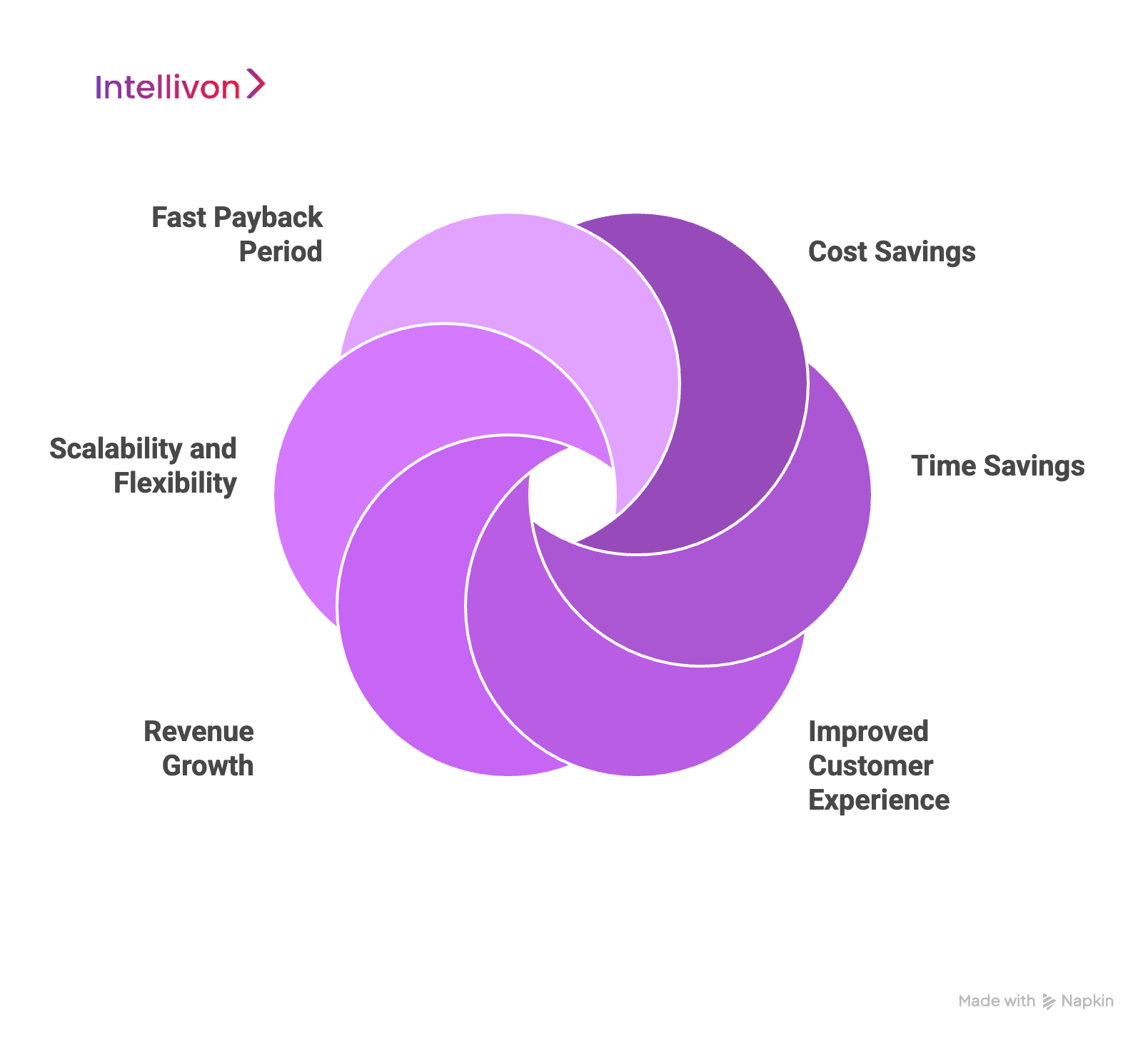
1. Cost Savings (Efficiency Gains)
One of the most compelling reasons to invest in AI agents is the significant cost savings they offer. AI agents excel at automating repetitive tasks, such as data entry, report generation, customer support, and inventory management, tasks that would otherwise require human labor.
By offloading these responsibilities to AI agents, your enterprise can significantly reduce the need for additional staffing, cutting operational costs. In addition to reducing the need for manual intervention, AI agents also minimize human error, further lowering costs associated with mistakes and inefficiencies.
2. Time Savings (Productivity Gains)
Apart from saving money, enterprise AI agents also save valuable time. In a fast-paced enterprise environment, time is a critical asset.
AI agents can process data, analyze trends, and execute decisions in real-time, helping your team make informed decisions faster. This reduces the time spent on mundane tasks and speeds up your overall workflow.
Additionally, AI’s ability to process data and make predictions quickly means your enterprise can act faster on market changes, customer inquiries, supply chain disruptions, or financial fluctuations.
3. Improved Customer Experience
AI agents have the potential to transform your customer experience by providing more personalized, quicker, and more effective interactions. Whether it’s through 24/7 support, tailored product recommendations, or dynamic issue resolution, AI agents create a seamless experience for your customers.
By continuously learning from customer interactions, AI agents become more adept at anticipating needs and offering relevant solutions, ultimately driving higher customer satisfaction and brand loyalty, key factors that contribute to long-term revenue growth.
4. Revenue Growth through Decision-Making
Through predictive analytics, AI agents provide insights into customer behavior, sales trends, and market conditions, which can help you make smarter decisions faster. They can optimize sales processes, recommend upsell opportunities, and identify new markets or products.
By automating tasks such as lead scoring and customer segmentation, AI agents ensure that your sales teams focus their efforts on high-value opportunities, ultimately leading to higher conversion rates and greater overall sales performance.
5. Scalability and Flexibility
One of the standout features of AI agents is their scalability. Unlike human employees, AI agents can handle an increasing volume of work without the need for additional resources.
This allows businesses to scale operations efficiently, whether you’re expanding customer support, growing your sales efforts, or processing more transactions.
As your enterprise grows, your AI agents will continue to scale with you, handling higher workloads and contributing to your long-term growth strategy.
6. Fast Payback Period
While the initial investment in AI agents may seem significant, the good news is that most enterprises see a rapid payback period.
With all the cost savings, productivity gains, and revenue increases, AI agents typically provide a return on investment within 6 to 12 months.
The payback period can vary depending on the scale of implementation and the specific industry, but businesses can expect to start seeing tangible ROI almost immediately, especially in areas like customer service, operations, and sales.
Real-World Examples and Industry Impact
AI agents are already delivering measurable ROI across industries. Here are a few examples:
1. Healthcare
- Cedars-Sinai Medical Center (USA):
Implemented the AI-powered CS Connect platform, leading to 77% optimal ratings for AI-generated treatment recommendations, enhancing physician focus on direct care.
- Mass General Brigham (USA):
Automated clinical documentation reduces time spent on note-taking by 60%, allowing more face time between doctors and patients.
2. Manufacturing
- Siemens (Global):
Used AI-powered predictive maintenance, cutting unplanned downtime by 30% and reducing maintenance expenses by 20%.
- Priestley’s Gourmet Delights (Australia):
Opened a $53 million AI-powered smart factory, doubling production capacity and creating job opportunities.
3. Retail
- H&M (Global):
Implemented an AI agent for product recommendations, improving conversion rates by 25% and reducing customer query response time by threefold.
- Sephora (Global):
Used AI-powered in-store tablets to provide personalized beauty consultations, enhancing customer satisfaction and loyalty.
These real-world case studies demonstrate the tangible benefits of AI agents, proving that the return on investment is measurable and impactful across industries.
If you’re interested in exploring how AI agents can deliver similar benefits to your organization, consider booking a session with our AI experts. They can provide a tailored ROI analysis specific to your business needs. Click here to schedule your session.
The Future of Enterprise AI Agents
As AI technology continues to evolve, the future of enterprise AI agents looks promising, with new trends emerging that will further revolutionize how businesses operate. Let’s explore some key trends that will shape the future of enterprise AI agents.
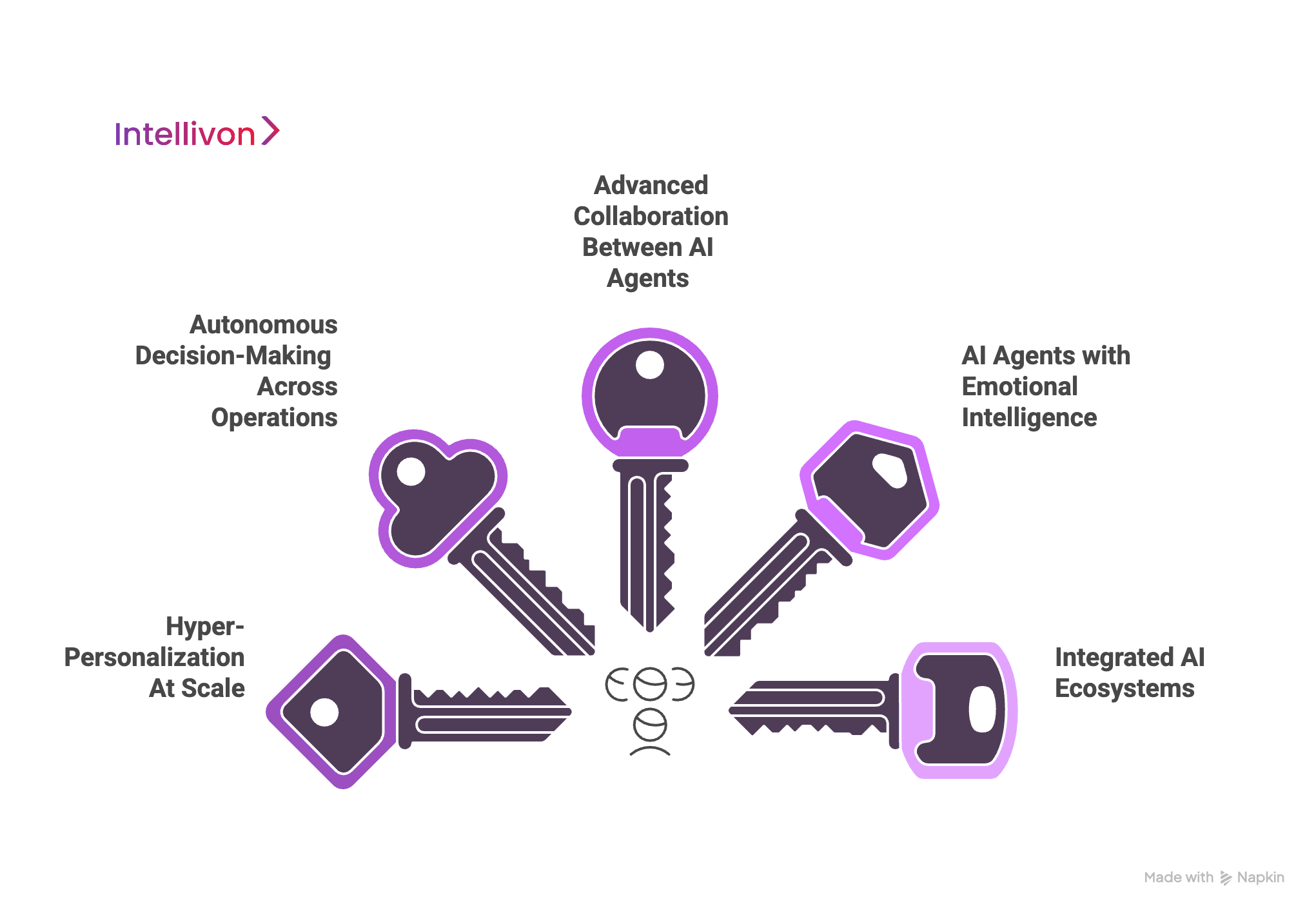
1. Hyper-Personalization at Scale
In the near future, AI agents will be able to personalize interactions for every single user in real-time, using advanced data analytics and machine learning models. Businesses will be able to deliver hyper-personalized content, product recommendations, and even onboarding experiences, fostering deeper engagement and stronger relationships with customers and employees.
Example: AI agents could dynamically adjust a website’s layout, product recommendations, and even marketing offers based on a customer’s browsing behavior, making every interaction feel uniquely relevant.
2. Autonomous Decision-Making Across Operations
AI agents will move beyond simply following predefined rules to making autonomous, data-driven decisions across entire business operations. Whether it’s supply chain management, inventory control, or resource allocation, AI agents will analyze real-time data and make decisions with minimal human intervention. This will free up management to focus on high-level strategy while the AI takes care of the operational details.
Example: In manufacturing, AI agents could autonomously adjust production schedules based on changing demand, machine health, or material availability, ensuring seamless and efficient operations.
3. Advanced Collaboration Between AI Agents
In the future, AI agents won’t operate in isolation. Instead, they will work collaboratively across multiple systems, departments, and even businesses. These multi-agent systems will enable AI agents to communicate and coordinate actions, working together to solve complex, cross-functional problems. This kind of collaboration will lead to more effective problem-solving, faster decision-making, and smarter resource allocation.
Example: A multi-agent system could optimize customer service, with one agent handling queries while another analyzes sentiment to prioritize issues, and another routes the queries to the correct department, all working together to improve customer experience.
4. AI Agents with Emotional Intelligence
In the next few years, we will see AI agents that are capable of understanding and responding to emotional cues. Through advancements in natural language processing (NLP) and sentiment analysis, AI agents will be able to detect emotions in both written and spoken communication. This capability will be particularly valuable in customer service and HR functions, where empathy and understanding are essential.
Example: An AI agent in customer service could detect frustration in a customer’s tone and escalate the issue to a human agent, ensuring that sensitive situations are handled with care.
5. Integrated AI Ecosystems
As AI technology matures, we will see the development of fully integrated AI ecosystems within enterprises. Instead of using individual AI tools or agents for specific tasks, businesses will deploy interconnected systems of AI agents that work across all departments. These ecosystems will ensure that AI agents are continuously learning from each other and collaborating to improve business outcomes across the board.
Example: A sales AI agent could feed customer data to the marketing AI agent, which then adjusts advertising strategies, while the HR AI agent uses sales data to predict workforce requirements, all feeding into a single unified business strategy.
The future of enterprise AI agents will bring a more autonomous, intelligent, and collaborative approach to business operations. As AI agents become more advanced, businesses will be able to streamline processes, improve decision-making, and create better experiences for customers and employees alike.
Conclusion
AI agents are transforming enterprise operations. They automate tasks, improve decision-making, and enhance customer experiences. These agents can scale with businesses and integrate across various systems, driving efficiency and innovation.
As AI continues to evolve, the potential for AI agents in enterprises will grow. This will help businesses stay competitive, reduce costs, and boost performance across departments.
Intellivons’ AI Agents: Sculpted to Fit Unique Enterprise Needs
Building an enterprise AI agent solution is about improving productivity, decision-making, and the overall efficiency of your operations. With 11+ years of experience delivering cutting-edge, AI-powered solutions, Intellivon is your trusted partner in designing custom AI agents that meet the unique needs of your business. Our solutions are designed with scalability, security, and efficiency at their core, ensuring long-term success and adaptability.
Why Choose Us for Enterprise AI Agent Solutions?
- Tailored Solution Design: Our AI agents are crafted to integrate seamlessly with your existing workflows, processes, and enterprise scale, creating personalized solutions for your specific needs.
- Future-Ready Integrations: Easily connect your AI agents with existing systems like CRM, ERP, and business intelligence platforms, ensuring that they work cohesively within your enterprise environment.
- Enterprise-Grade Security: We prioritize robust encryption, data privacy, and compliance-first practices to ensure the safety and integrity of your operations.
- Optimized Cost Efficiency: With proven frameworks and efficient development methods, we reduce time-to-market while maintaining top-tier quality and performance.
- Scalability for Growth: Our AI solutions are designed to grow with your business, from initial implementation to large-scale, enterprise-wide deployment.
Our AI Agent Experts Are Ready to Help You:
- Define your AI agent needs with precision based on operational and business requirements.
- Build scalable, modular solutions that align with your enterprise’s growth and changing demands.
- Provide clear cost estimates based on features, infrastructure, and integration requirements.
- Develop, test, deploy, and offer ongoing support to ensure your solution’s success.
Book your free consultation today and begin building the secure, intelligent, and scalable AI agent solution your enterprise deserves.
FAQs
Q1. How do AI agents help automate business tasks?
A1. AI agents automate repetitive tasks like data entry, customer support, and report generation. By handling these tasks, they free up employees to focus on higher-value activities.
Q2. What industries can benefit from AI agents?
A2. AI agents are beneficial in industries like healthcare, retail, finance, manufacturing, logistics, and customer service. They improve efficiency, decision-making, and customer experiences across sectors.
Q3. Are AI agents expensive to implement?
A3. While the initial investment can be significant, AI agents typically offer a quick return on investment by saving time, reducing costs, and boosting productivity. The cost can be scaled based on your needs.
Q4. Can AI agents be customized to my business needs?
A4. Yes! AI agents can be tailored to fit your specific workflows, data sources, and business requirements. Customization ensures that they integrate seamlessly with your existing systems.
Q5. How do AI agents improve employee productivity?
A5. AI agents automate routine tasks, allowing employees to focus on more strategic and complex work. They also assist in data analysis and decision-making, helping employees work faster and more effectively.

